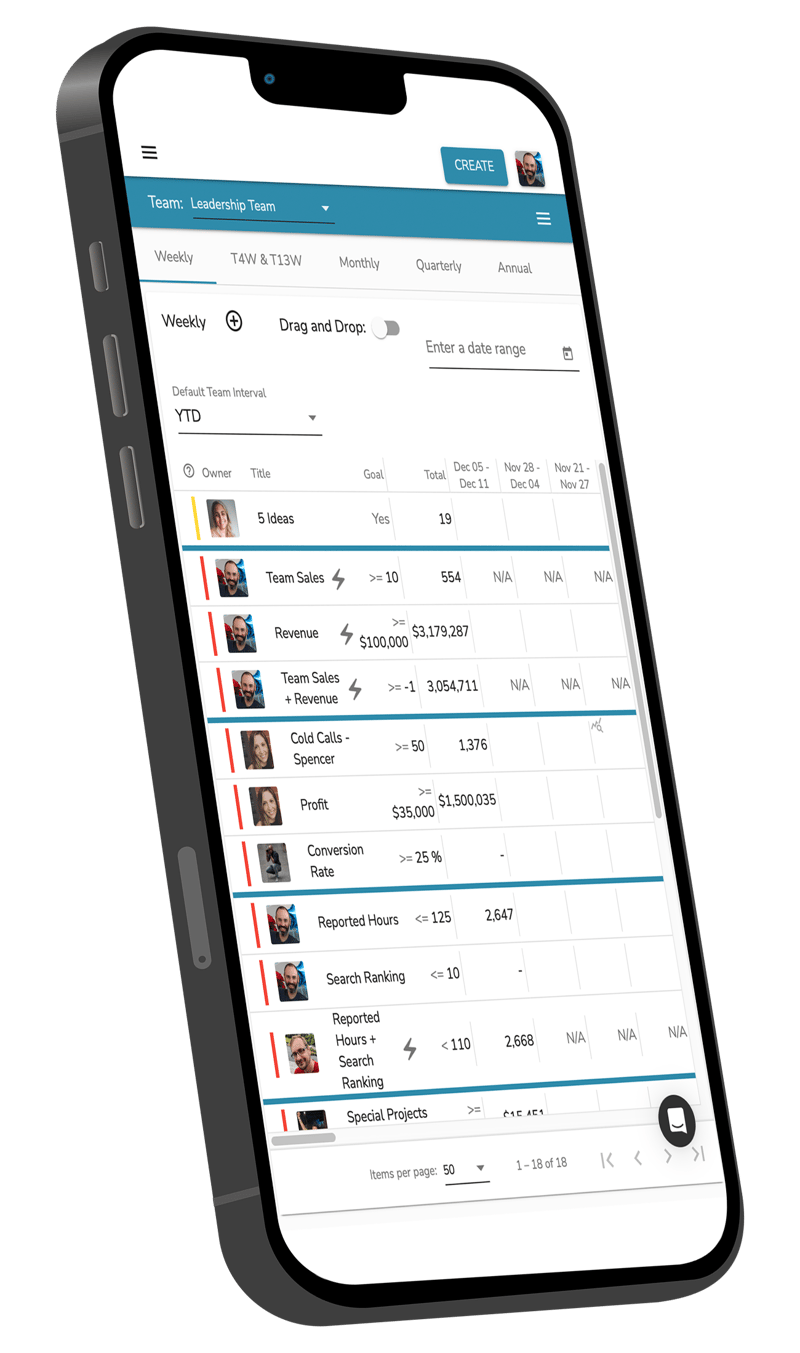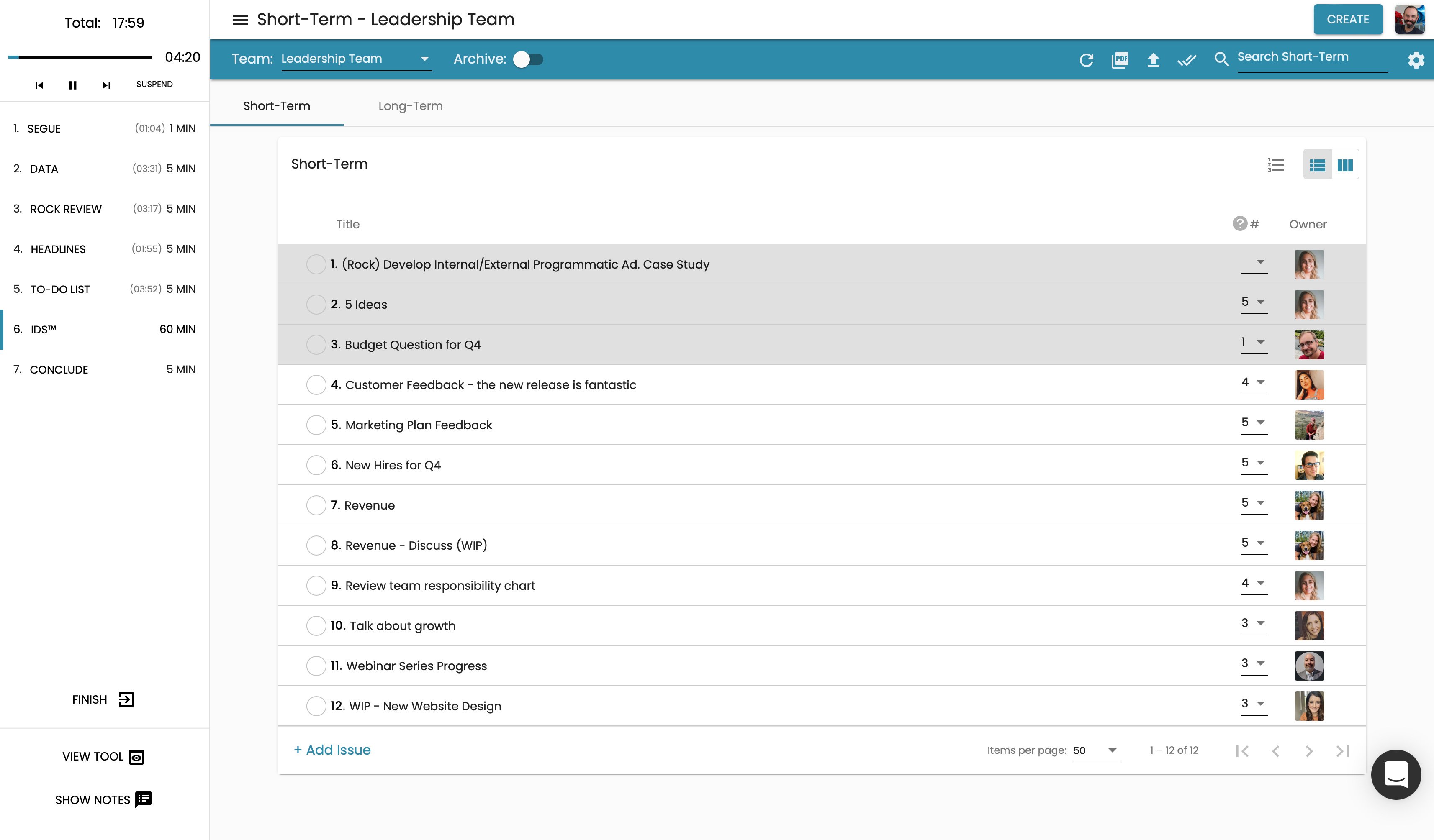Tool Brief
Weekly Team Meetings
“This meeting could have been an email” has
become a cliché, but that doesn't make it any
less accurate.

Ninety makes it easy to have great Weekly Team Meetings
We can't promise the Meetings tool will work magic, but there’s a reason companies have used Ninety’s Meetings tool hundreds of thousands of times. Teams can create custom agendas to fit their unique needs or use our standard agenda, which hits the four most important reasons for having a Weekly Team Meeting in the first place:
Ensuring we’re on top of things that matter
Sharing good news with the team
Creating a consistent time and place to address issues and opportunities
Deepening team connections and health
Components of a Weekly Team Meeting
Here’s a quick overview of each of the sections within Ninety’s standard agenda:
Segue
Each meeting starts with a Segue. During the Segue, everyone shares a piece of personal and professional good news. The idea is to stay connected as humans. Think of it as a quick gratitude session.
Headlines
Headlines are bits of news that are important but not necessarily related to the company's goals. Think "Jill had her baby" or "Stephen's going out of town for a week." If it’s news worth sharing with other teams, share it using the Cascading Messages feature.
Rocks
We execute a quick fly-by to ensure our Rocks are on track for completion by the end of the quarter. If a Rock looks off track, ask if the Rock owner or any other team member needs to discuss it further. If they do, make it an Issue. No discussion (yet).
To-Dos
We only need five minutes to check our To-Do List and see if there are any complications. If something is off track, right-click and set it as an Issue. We’ll have time to dissect it later.

Scorecard
Every team needs a Scorecard containing KPIs and targets to ensure everything is running well. Review the Scorecard, but don’t fall into the trap of analyzing each number. If there’s a problem, move the KPI to the Issues list.
RDR (Raise, Discuss, and Resolve)
Time to tackle the Short-Term Issues list. Rank Issues from 5 (must discuss today) to 1 (not urgent). Then, let each team member raise their Issue, discuss it with the group, and resolve it in one of three ways:
- Make it a To-Do
- Turn it into a Long-Term Issue
- Resolve it together
Organize and document each decision in the Meetings tool.
Conclude
Issues handled, it’s now time to Conclude our meeting. We take a moment to assess and score our meeting experience from 1 to 10. Was it effective? Was time used judiciously? Scores under 9 should be explained so we can do better next time.

Core Disciplines of
Weekly Team Meetings
- Same day, same time, same agenda. Start on time, end on time.
- Save discussions for the RDR section. That means the only words and phrases shared before the RDR section are: yes, no, on track, off track, please, make it an Issue, or make it a To-Do.
- During the week, if someone comes to the team leader with an issue, ask if it can wait for the WTM. This simple discipline encourages teams to problem-solve together, saving everyone time in the long run.
Hopefully Helpful Hints
Effective Meetings
Don't worry about being perfect

Respect the timer
Try not to go over time

Every Team Member
Every team member, every meeting, every week

Meeting Roles
Facilitator and Scribe

Rotating Roles
Mix things up every week

Effective Meetings
Don't worry about being perfect

Respect the timer
Try not to go over time

Every Team Member
Every team member, every meeting, every week

Meeting Roles
Facilitator and Scribe

Rotating Roles
Mix things up every week

Takeaway
Weekly Team Meetings provide a safe, productive environment to solve problems, prioritize tasks, and ensure To-Dos and Rocks are on track. As a result, they free up more time to Get Smart Stuff Done (GSSD). A properly run WTM is invaluable, saving teams much more time than it takes.
What’s more, meeting weekly as a team fosters a profound sense of connection. WTMs empower team members to take ownership of and pride in their contributions — and crystalize how those contributions further the team’s goals.

Want to Learn More about Weekly Team Meetings?
Download the full meeting guide by clicking below.

